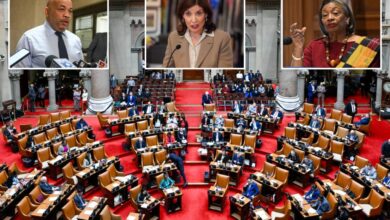Canadian Prime Minister Mark Carney’s Liberals win an election upended by Trump

Prime Minister Mark Carney’s Liberal Party emerged victorious in Canada’s federal election, marking a significant turnaround in their fortunes. This unexpected win was fueled by the annexation threats and trade war initiated by US President Donald Trump. The Liberals are projected to secure more seats in Parliament than the Conservatives, potentially allowing them to pass legislation without requiring additional support.
The tide began to shift in favor of the Liberals when President Trump started targeting Canada’s economy and sovereignty, even suggesting that the country should become the 51st state of the US. These actions by Trump not only infuriated Canadians but also ignited a surge in nationalism, ultimately aiding the Liberals in securing a fourth consecutive term in power.
The opposition Conservative Party, led by Pierre Poilievre, aimed to make the election a referendum on former Prime Minister Justin Trudeau, whose popularity had waned due to rising food and housing prices. However, Trump’s interference, coupled with Trudeau’s resignation and Carney’s emergence as the Liberal Party leader and prime minister, altered the course of the election.
Trump’s aggressive stance towards Canada led to a significant backlash among the Canadian populace, with many opting to boycott US products, cancel vacations to America, and even cast their ballots early. A record 7.3 million Canadians participated in early voting, reflecting the heightened engagement and interest in the election.
The election took place against the backdrop of a tragic incident at a Vancouver street fair, where a local man with a history of mental health issues carried out a deadly attack. This event briefly suspended campaigning activities and added a somber note to the election proceedings.
Poilievre and the Conservative Party found themselves on the defensive due to Trump’s interventions, as the surge in nationalism favored the Liberals. Carney emphasized the importance of protecting Canada’s sovereignty in the face of external threats, resonating with voters who were concerned about the country’s independence.
Despite challenges ahead, including US tariffs on Canadian goods and a lingering cost-of-living crisis, the Liberals are gearing up to address these issues. With over 75% of Canada’s exports directed towards the US, Trump’s tariff threats pose a significant risk to the Canadian economy. Carney and his team will need to navigate these challenges while upholding Canada’s interests on the global stage.
In conclusion, the unexpected victory of the Liberal Party in Canada’s federal election underscores the impact of external factors, such as Donald Trump’s actions, on domestic politics. The upcoming term will present significant challenges, but the Liberals are poised to lead the country through these turbulent times.





